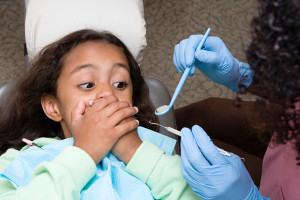 Open your mouth and let people you never met before poke inside your mouth with sharp metal objects used in other people’s mouths. And, gag on these pieces of hard paper while someone blasts you with radiation. Oh, some of your teeth may have exposed nerves and your gums are going to bleed a little. By the way, you’re not flossing enough and you’re brushing your teeth wrong.
Open your mouth and let people you never met before poke inside your mouth with sharp metal objects used in other people’s mouths. And, gag on these pieces of hard paper while someone blasts you with radiation. Oh, some of your teeth may have exposed nerves and your gums are going to bleed a little. By the way, you’re not flossing enough and you’re brushing your teeth wrong.
None of that is something to smile about. But—to a much lesser degree—all of that is what happens in the dentist’s chair. It’s no wonder why so many people of all ages are afraid of the dentist. What follows is our attempt to alleviate some of the trepidation involved with your dental appointment and to manage your expectations of what’s going to happen in the dental chair.
What’s the matter?
There’s a lot that goes on during an appointment with the dentist. There’s preventative, like X-rays. There’s an exam. There’s a cleaning. And there’s consultation—advice giving. That means, every type of person probably has at least one uncomfortable moment while at the dentist.
Potential fears and discomforts include:
- Injections
- Sound sensitivity (scraping the teeth, drilling, polishing)
- Claustrophobia (feeling trapped/vulnerable in the chair)
- Embarrassment over hygiene and/or habits
- Gag reflex
When you factor in hard-to-swallow data such as 1 in 4 women and 1 in 9 men experiencing severe intimate partner physical violence, it’s not hard to imagine that nearly every person in a dental chair is going through some level of stress just being there.
What’s your problem?
One way to manage something problematic is to define, or at least categorize, it. Not all fears are the same.
Dental anxiety—This is a stress level that involves anticipation and speculation. Uncertainty is a major factor in anxiety. So, to mitigate this, spend time asking questions when making your appointment. If there is a specific trigger for you, ask the person booking your appointment about it. For instance, if you know the sound of drills freaks you out, ask if you can wear a headset and listen to music during your appointment. You can also spend a few, let’s call them meditative, moments before your appointment reminding yourself verbally of the things you don’t like about the dental experience, reassuring yourself that it’s a temporary experience, and thinking about how clean your teeth are going to look and feel shortly.
Dental fear— This tends to be specifically related to particular past experience. Again, communication pre-appointment or at the start of the appointment is helpful. If you have a nagging sensitive area in your mouth, let’s say, the hygienist can offer things like a topical numbing solution. Part of your dental care provider’s job is taking care of your anxiety levels. In fact, that’s why dentists often check your blood pressure before a session. The staff is—or at least should be—skilled in easing these fears both with verbal reassurance and clinical technique.
Dental phobia—This is an extreme fear of the dentist that may trigger feelings of high anxiety and even panic. For many people, some level of therapy may be required to overcome this. Your dentist may have specific clinicians who can assist you, so make sure to ask. Your phobia is not uncommon. There are additional resources you can find online, such as forums like this one: dentalfearcentral.org/forum which connect you with other people in your situation.
Communicate, communicate, communicate … That’s the key to resolving whatever level of fear you’re experiencing. And to do that, you need to open your mouth.







Leave a Reply